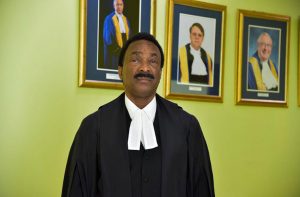THE application filed by former Attorney General and Minister of Legal Affairs Anil Nandlall seeking an order compelling the Cabinet, including the President, to resign, will be heard by Chief Justice (ag) Roxane George-Wiltshire on September 9,2019, at the High Court.
Nandlall approached the High Court on the issue although the Caribbean Court of Justice (CCJ) has already ruled on the matter.
In a Fixed Date Application (FDA) filed on Monday, August 26, 2019, Nandlall in seeking the order compelling Cabinet to resign, said such ought to be the consequence of the no-confidence motion passed against the government last December in accordance with Article 106 (6) of the Constitution.
Minister of Legal Affairs and Attorney General Basil Williams is listed as the respondent in the matter.
Nandlall is also seeking a Conservatory Order restraining the Cabinet, inclusive of the President, from meeting, making decisions as, or performing the functions of Cabinet.
This application, however, comes close to two months after the CCJ addressed the functionality of government and its Cabinet in light of the successful no-confidence motion, and pursuant to the Constitution.
According to Articles 106 (6) and (7) of the Constitution, the Cabinet, including the President, shall resign if the government is defeated on a vote of confidence; however, notwithstanding that defeat, the Government must remain in office, and hold an election within three months, or during an extended period approved by two-thirds of the National Assembly.

President of the CCJ Justice Adrian Saunders, in ruling on the matter, said while the judiciary interprets the Constitution, the provisions outlined in Article 106 (6) and (7) require no gloss on the part of the court.
“Their meaning is clear and it is the responsibility of constitutional actors in Guyana to honour them.
Upon the passage of a vote of no-confidence, the Article requires the resignation of the Cabinet, including the President.
The Article goes on to state, among other things, that notwithstanding such resignation the government shall remain in office and that an election shall be held ‘within three months, or such longer period as the National Assembly shall by resolution supported by not less than two-thirds of the votes of all the elected members of the National Assembly determine…,’” Justice Saunders reasoned as he delivered the consequential orders at the Trinidad-based CCJ last July.
He made it clear, however, that until elections are held, the President remains the President and the government must operate as an “interim government.”
Justice Saunders explained that in mandating that the government remain in office notwithstanding its defeat and the resignation of the President and the Cabinet, Article 106 requires that Cabinet’s tenure in office be on a different footing from that which existed before passage of the no-confidence motion.
He posited that Chancellor of the Judiciary Justice Yonette Cummings-Edwards, in citing Hogg, the Canadian constitutional expert, was right to note that the government continues in office as an interim government. Since the delivery of the consequential orders, President David Granger and his government have adopted an interim mode.



.jpg)








